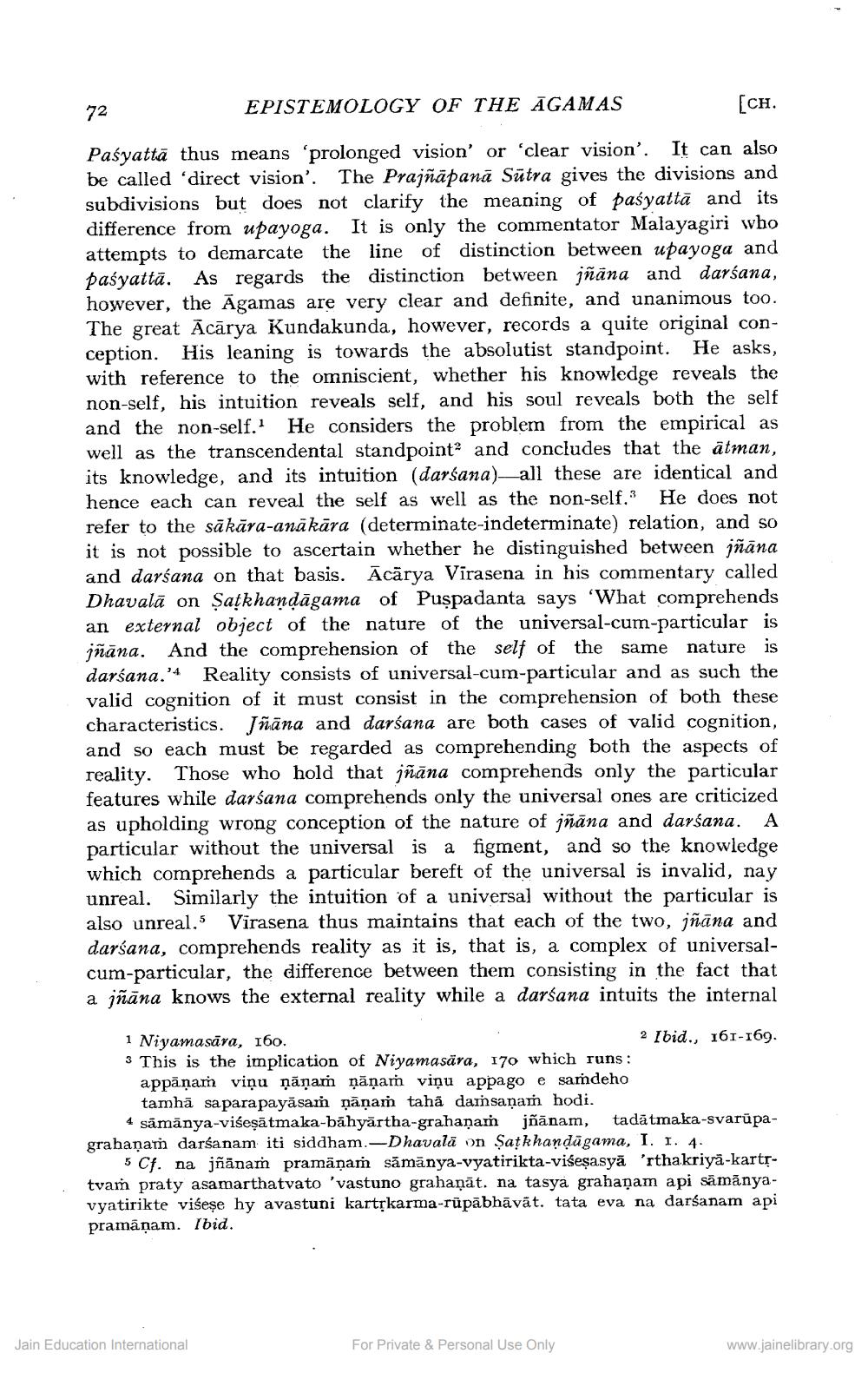________________
72
EPISTEMOLOGY OF THE ĀGAMAS
[CH.
Paśyattă thus means 'prolonged vision' or 'clear vision'. It can also be called 'direct vision'. The Prajñāpanā Sūtra gives the divisions and subdivisions but does not clarify the meaning of paśyatta and its difference from upayoga. It is only the commentator Malayagiri who attempts to demarcate the line of distinction between upayoga and paśyattā. As regards the distinction between jñana and darśana, however, the Agamas are very clear and definite, and unanimous too. The great Acārya Kundakunda, however, records a quite original conception. His leaning is towards the absolutist standpoint. He asks, with reference to the omniscient, whether his knowledge reveals the non-self, his intuition reveals self, and his soul reveals both the self and the non-self. He considers the problem from the empirical as well as the transcendental standpoint and concludes that the ātman, its knowledge, and its intuition (darśana)—all these are identical and hence each can reveal the self as well as the non-self. He does not refer to the sākāra-anā kāra (determinate-indeterminate) relation, and so it is not possible to ascertain whether he distinguished between jñāna and darśana on that basis. Ācārya Virasena in his commentary called Dhavalā on Satkhandāgama of Puspadanta says 'What comprehends an external object of the nature of the universal-cum-particular is jñāna. And the comprehension of the self of the same nature is darśana.'4 Reality consists of universal-cum-particular and as such the valid cognition of it must consist in the comprehension of both these characteristics. Jñāna and darśana are both cases of valid cognition, and so each must be regarded as comprehending both the aspects of reality. Those who hold that jñāna comprehends only the particular features while darśana comprehends only the universal ones are criticized as upholding wrong conception of the nature of jñana and darśana. A particular without the universal is a figment, and so the knowledge which comprehends a particular bereft of the universal is invalid, nay unreal. Similarly the intuition of a universal without the particular is also unreal.5 Virasena thus maintains that each of the two, jñāna and darśana, comprehends reality as it is, that is, a complex of universalcum-particular, the difference between them consisting in the fact that a jñāna knows the external reality while a darśana intuits the internal
1 Niyamasāra, 160.
2 Ibid., 161-169. 3 This is the implication of Niyamasāra, 170 which runs :
appāņam viņu ņāņam ņāņam viņu appago e sardeho
tamhā sa parapayāsam ņāņam tahā dam saņam hodi.
4 sāmānya-viśeşātmaka-bahyārtha-grahaņam jñānam, tadatmaka-svarūpagrahaņam darśanam iti siddham.-Dhavala on Satkhandāgama, I. I. 4.
5 Cf. na jñānam pramānam sāmānya-vyatirikta-viśeşa.syā 'rthakriya-kartrtvam praty asamarthatvato 'vastuno grahaņāt. na tasya grahaņam api sāmānyavyatirikte viseşe hy avastuni kartskarma-rūpābhāvāt. tata eva na darśanam api pramāņam. Ibid.
hanan
jñānadügama, I. 1Aiva-kartı
Jain Education International
For Private & Personal Use Only
www.jainelibrary.org




